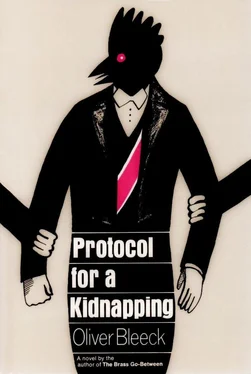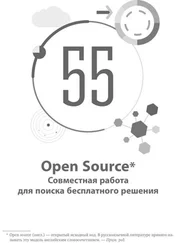When I came out of the bar the hotel’s paging system started blaring my name through the lobby. At the information desk a rather uppity clerk sniffed and said that yes, there was a message for me, a note, but that “some person” had refused to leave it with the desk and was insisting on turning it over to me himself. The clerk pointed a nicely cared for finger at “some person” so I turned to see who it was.
He was no more than sixteen or seventeen and had pimples and wore his brown hair down around his shoulders in frizzy curls. He leaned against one of the walls, working hard on a mouthful of gum while he gave the Metropol’s lobby and guests a contemptuous sneer. I walked over to him.
“Hi,” he said.
“You got something for me?”
“You’re Mr. St. Ives?”
“That’s right.”
“I got a letter for you. I’m supposed to wait while you read it.” If his English had any accent, it was pure American and I suspected that he had learned it at the movies.
I waited for him to hand the letter over to me, but when he made no move, I said, “How much?”
His eyes were roving around the lobby again. “How much does it cost for a room here?”
“Mine costs two hundred dinars a day, but I held out for a view.”
He whistled. “That’s sixteen bucks.”
“The letter,” I said.
“I’m supposed to see some ID.”
“Where’d you learn it?” I said, reaching for my billfold.
“What?”
“Your English.”
He shrugged. “I belong to a film society.”
“It must meet every day,” I said and handed him my New York driver’s license. He looked at it and then handed it back. One of his hands disappeared under the folds of his long green cape that looked as if it had been cut from a blanket and reappeared holding an envelope.
“I’m supposed to wait while you read it,” he said.
“I know.”
I opened the envelope and the message was brief, concise, even trenchant. It said:
How do you propose to get a dead man out of the country? I think we should discuss it. The boy will guide you.
Bjelo-Stepinac
“Shit,” I said and put it away in my coat pocket.
The kid looked hopeful. “Bad news?”
“Just average,” I said. “Let’s go. What do we do, walk or take a cab?”
“I got my bike,” he said. “You can ride on the back.”
“Bike?”
“Motorcycle.”
“We’ll freeze.”
He looked at me scornfully. “It’s not that cold.”
I glanced around the lobby. A man in a brown topcoat dropped his eyes back to his newspaper. A younger man suddenly became fascinated with a wall advertisement for JAT. I turned back to the kid. “Let’s go,” I said. “Right now.”
He liked the idea and we moved quickly across the lobby, through the hotel’s entrance, and out into the street. It was dark, but the streetlights furnished enough illumination to make out a motorcycle parked at the curb about a hundred feet away. The kid trotted toward it. I turned once to watch two men hurry from the hotel, buttoning their overcoats. They were the newspaper reader and the one who had liked the JAT poster.
The kid knew how to ride his bike. It was a 250 cc BMW and I never got around to asking him how long he had saved for it. He had the engine started by the time I got my leg over the buddy seat. He paused only long enough to give the throttle a couple of twists with his gloved hands to produce the standard varooms that are obligatory for all motorcycle departures and we were off. I twisted my head in time to see the two men who had been in the lobby pile into a Volkswagen. I shouted at the kid, “Can you lose a Volkswagen?”
He nodded vigorously and to prove it he made a sharp right turn off Bulevar Revolucije at the Federal Assembly which almost lost me instead. From there on he turned almost every block. We headed north and east, but after the first two turns I was lost. I gripped the back of the buddy seat at first, but that proved impractical so I held on to his waist. My hands froze there just as well. While they were freezing I kept thinking, “You’re too old for this, St. Ives. Your bones are brittle with age.” If he had stopped, I would have gotten off, but he didn’t so I hung on and tried to think of someone to blame. I came up with Myron Greene and silently swore at him for a while and then tried to think of people who might know of a job in public relations.
The kid rounded another corner and screeched the machine to a halt. “What’s the fare?” I said, getting off quickly.
He shrugged. “You don’t owe me nothing.”
I found a hundred dinars and handed them to him. “It was an unforgettable experience. Where am I supposed to go?”
“Down there toward the river,” he said, pointing to a narrow street that sloped toward the Danube. He leaned forward to peer at me. “You know something?” he said.
“What?”
“The guy who gave me the letter.”
“What about him?”
“He looks a lot like you. But he’s younger.”
“Everybody is,” I said and turned, heading for the narrow street. The kid said good-bye with a couple of varooms that blasted off the buildings.
The street had no name that I could see, not even one written in the usual Cyrillic letters which make finding any place in Belgrade twice as much fun. The street was bordered by two large brick warehouses. I walked down it slowly, listening to the sound of my leather heels as they struck the pavement, making measured and solemn echoes.
There were no windows in the warehouses and the street that ran between them was barely wide enough to permit the passage of trucks. I noticed that in several places the bricks were scarred where drivers had misjudged either the width of their trucks or the narrowness of the street. I kept walking, listening to the sound of my footsteps. At the end of the street between two buildings was a darker patch of something that I took to be a slice of the Danube.
He came from the left, out of the setback in a warehouse. “Keep on walking,” he said. It was Stepinac and he fell into step with me as we neared the end of the narrow street which really wasn’t much more than an alley.
“I got your note,” I said.
“The boy was the only messenger I could find,” he said. “We need to talk.”
“What about?”
“About Anton Pernik who’s dead.”
“I know,” I said.
“It doesn’t change your plans?”
“No,” I said. “Not really.”
“I do not like what you are doing to Gordana.”
“I don’t like it much myself.”
“She said that you are going to take her to New York.”
“Take isn’t quite the right word,” I said. “I’m going to try to see that she gets there.”
“I have just come from her,” he said.
“Oh.”
“She made me promise not to report her grandfather’s death.”
I could have wondered how she made him promise that, but instead I said, “Your note said that you wanted to talk about Pernik.”
“Yes.”
“Well?”
“My superiors are not at all satisfied with the kidnapping.”
“They don’t like the technique?”
“The technique does not disturb them. The motive does.”
“A million dollars adds up to a lot of motive,” I said.
“Anton Pernik adds up to nothing.”
“You’d better spell it out for me,” I said.
“Very well. Just before your ambassador was kidnapped, I had spent many hours interviewing Anton Pernik about his past and present associations. A day would have been sufficient really, but I dragged the sessions out because of Gordana.”
“Pernik told me about them,” I said.
“Yes. Well, I came to know more about Anton Pernik than I really wanted to. Incidentally, he was a terrible poet. I also discovered two things. The first is that the American ambassador is in love with Anton Pernik’s granddaughter.”
Читать дальше












